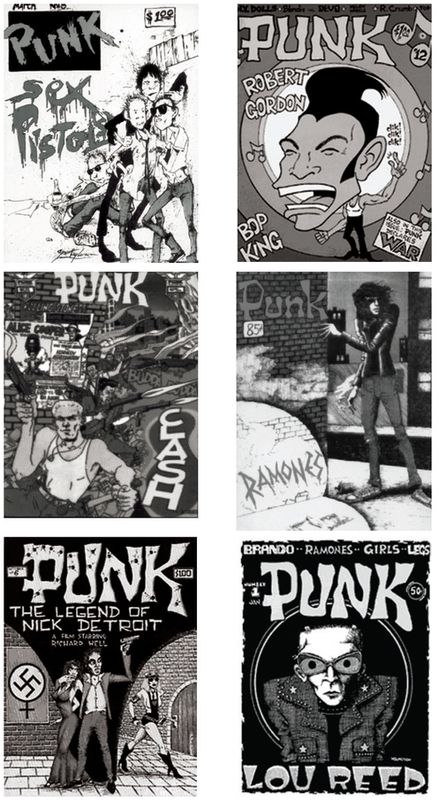
No More Mr Nice Guy: The Brand New Us And Them
When Punk magazine writer Mary Harron went to England to interview Johnny Rotten in the autumn of 1976, she returned to New York infected with Sex Pistols Fever, convinced that she had seen the future.
Before she went, Mary was also quite certain of the validity of the New York Punk scene, and was very generous with her praise of it – but still, it was nothing compared to her adoration of Rotten and the Pistols on her return, which made me sit up and take notice.
‘Hey Mary, you actually like this guy?’ I asked before I read a copy of her interview.
‘Johnny Rotten’s somebody who has a vision,’ she told me, ‘And for whatever reason, he’s absolutely the center of this spinning, chaotic world – and he really does see it – because he embodies the thing that he is representing – that he is the spokesman for – and there was no bullshit. Johnny was the thing he was representing.
‘He gave really clear and quite profound answers’ Mary claimed, ‘He’s very smart, very confident, very funny, very young and he absolutely knows what’s going on. I remember thinking while I was interviewing him, how incredibly smart he is. Johnny Rotten is one of the smartest people I have ever met.’
Of course. Harron went on to become the world famous film director of such movies as I Shot Andy Warhol, American Psycho and The Notorious Bettie Page.
But, before she found herself, Mary was a bit of a snob – Oxford-educated, theatre critic for The Observer, step-daughter of internationally famed author Stephen Vizinczey (In Praise of Older Women), step-daughter of Stanley Kubrick actress, Virginia Leith, and daughter of famed Canadian comic, Don Harron. If that wasn’t confusing enough, one of Mary’s stepmoms went on to marry play-right Harold Pinter.
While I always thought it might have been John Holmstrom’s sick sense of humour that sent Mary to interview Rotten, I must confess that I agreed with her take on Johnny.
‘I was very scared when I went to interview him,’ Harron confessed to me several years later, ‘Because I was easily intimidated, and, after all – it was Johnny Rotten. The two scariest people I’ve interviewed were Lou Reed and Johnny Rotten. But actually, Johnny was wonderful, and very nice to me that night. He protected me from the others – Steve Jones and Glen Matlock – were kind of drunk and making rude remarks to me. Johnny told them, ‘She’s alright, let it go, she’s alright.’
Mary: What goes through your head when you’re singing? What do you feel?
Johnny: It’s like – (makes a face)
Mary: No, no, cut the shit. (laughing)
Johnny: I never understood why people are scared to go onstage, ’cause it doesn’t take anything. You don’t have to be drunk or out of your head. Just walk up there, that is if you feel like doing it.
‘Like all the legendary events that I have attended in my life, the Sex Pistols concert was half empty,’ Mary told me, ‘The club was called Eric’s, in Liverpool. It was quite a big nightclub, and it was half empty. There was hardly anybody there. There were about five people dressed like punks, and they all knew each other. If some movie director was filming this now, they would have everybody dressed like a punk.’
Mary: Did you ever have nerves before you went on?
Johnny: The first time, yeah. The first time I knew I wasn’t getting it from a group.
‘Did I tell you that I brought all these kids that were hanging around, into the interview with me?’ Mary asked, ‘I’d met all these kids in rubber trousers who looked terrifying in their fetishist clothing. Some of the Bromley Contingent were there, including Siouxsie Sioux, but mostly they were just hairdressers and art students from Liverpool. Sweet kids. Their dream in life was to meet the Sex Pistols, so I brought them into the interview with me.’
Johnny: What’s New York like, anyway?
Mary: It’s really good.
Johnny: The New York groups, they’re very into proving how good they are… how intellectual… I don’t like that. I think that’s silly.
Mary: What don’t you like about it?
Johnny: You know, going on about social significance, blah, blah…
‘When I first saw English punk,’ Mary laughed, ‘I thought, “Oh my god, oh my god, what have we done, what have we created?” I thought what we had done in New York as a joke – had been taken for real by a younger and more violent audience in England. It was like everything we had done ironically, in New York punk, the English took seriously.
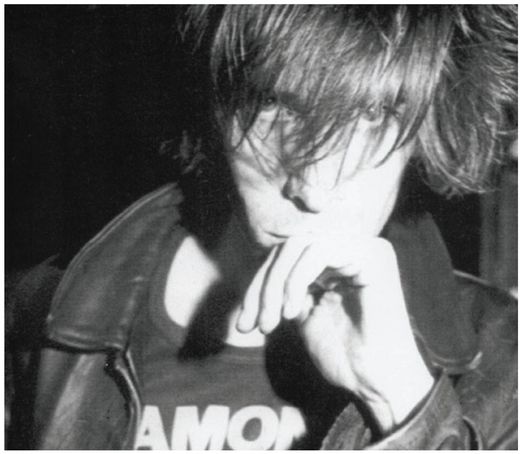
Legs McNeil
‘The English punk scene was more in your face and you couldn’t help notice it,’ Mary continued, ‘There was a violence under the surface – it was much more kind of raw and real. You felt something could erupt at any moment; smashed glass, a real kind of violence. It was much more volatile and edgy – and more dangerous.’
Mary: But people are always saying your music is socially significant?
Johnny: BUT WE DON’T, DO WE? We want to be AMATEURS. Don’t mouth your own philosophies, or you’ll just get laughed at.
‘I really liked the Sex Pistols as well,’ Mary continued, ‘I mean, that was a great show, I mean, it was bad – it was sloppy, but I loved the way Steve Jones played guitar. It was just like any good rock band, really. There was a little bit of casual heckling. I remember Johnny holding the mike and saying, “FUCK OFF SUNSHINE!” He was very sarcastic – and doing this weird kind of dance.’
Mary: How did you feel about the set?
Johnny: It wasn’t a good one. We can do much better than that. We were in Wolverhampton last night. And Dundee the night before. Fuckin’ traveling around in the back of a van is no fun. It fucks you up.
‘One thing I was aware of sitting backstage,’ Mary noted, ‘Was that Johnny was very aware of what people expected of him – and he could play with that – or he could intimidate people if he wanted to. He already had that power. I don’t think he could help it really, he’d already been written about – and he was kind of making fun of it.’
‘My ex-boyfriend, who I’d dragged along with me, absolutely hated the show,’ Mary laughed, ‘He was just disgusted by Rotten and the Pistols and he told me, “I’m very sorry but the whole thing is just a con. It’s all just hype! It’s all been masterminded by their manager, Malcolm McLaren! It’s a scam, and you’re really stupid to have fallen for it!”
‘He was just snide about it,’ Mary continued laughing, ‘And he found it hard to admit he was wrong.’
Mary: Do you think the anarchy thing has been misrepresented?
Johnny: People are trying to make it out as a bit of a joke, but it’s not a joke. It’s not political anarchy either, it’s musical anarchy, which is a different thing.
I really felt the world moving and shaking that autumn in England, in terms of punk,’ Mary confessed, ‘I went to interview The Damned – I was supposed to do The Clash and that fell through – but there was definitely a sense of something big happening.’
Mary’s interview was my first introduction to Johnny Rotten and the Sex Pistols, and it captures Rotten when he was still a fresh-faced, snot-nosed kid – his world spread-eagled before him with stunning possibilities. Johnny seemed like a sweet kid. Mary got him at just the right moment, before everything came crashing down on him.
By the time Mary did the interview in October 1976 and it was published in Punk magazine in March 1977, the interview was already obsolete. That’s how fast things were happening.
In that time, the Pistols were signed to EMI Records, released their first single, ‘Anarchy In The UK,’ and then came the infamous December 1st 1976 appearance on the Bill Grundy television program. The Pistols, along with their entourage, ‘The Bromley Contingent,’ (including Siouxsie Sioux) appeared on the Thames Television Program, Today.
Johnny Rotten said, ‘Shit.’
Steve Jones told Bill Grundy he was, ‘A Fuckin’ Rotter’.
All in all, it was not as offensive as what is regularly seen on The Jerry Springer Show. Still, it was enough of a sin to snare the headlines – the Daily Mirror ran with the now infamous ‘The Filth and the Fury,’ while the Daily Express went with ‘Punk? Call it Filthy Lucre.’
The Pistols were oblivious to the fuss they’d caused, and left the TV show to pick up Johnny Thunders & The Heartbreakers at Heathrow Airport, since the New York band was scheduled to open for the Pistols on their ‘Anarchy In The UK Tour’. The Heartbreakers were there to lend the Sex Pistols some punk credibility, but after the TV show, they didn’t need any.
‘Someone called me in New York,’ Mary explained, ‘And said that she just heard that Johnny Rotten had been on this TV show and had said, “Fuck” or whatever. I had the number for Malcolm McLaren, so I called him in London and I could tell he was kind of shocked. It was Malcolm and Lee Black Childers, the manager of Johnny Thunders & The Heartbreakers. I talked to both of them. And I just thought, “Whoa-oh!” Because, quite in contradiction to the myth of Malcolm as a great manipulator, Malcolm said, “I can’t believe what just happened!” I think they felt like they were on a runaway train.’
The resulting fallout from the Grundy show caused local authorities to cancel most dates on their Anarchy Tour – and as a hostile press slagged off the band – the Sex Pistols succeeded in becoming the world’s first Punk band.
It didn’t matter that The Ramones, The Damned, Patti Smith, Iggy Pop, The Slits, Richard Hell & The Voidoids, etc, were already going concerns. It the old music business dictum of ‘Whoever gets the most press, wins,’ the Sex Pistols captured the English imagination – and then the world’s.
The Pistols and their ilk, looked disturbing, even to me. If you doubt this, ask yourself, ‘What looks more shocking? A Johnny Ramone bowl-cut or a day-glo mohawk?’ Suffice to say, it was in that moment, everything we had done in New York - the magazine, the music, the scene – were no longer valid. And what made it even worse was that the Pistols sounded so good.
Cheetah Chrome, the Dead Boys’ lead gutarist told me, ‘We were really happy with the first album that we had just done, when somebody put on the Pistols’ first records and we went, “What the fuck?!”’
When the ‘Anarchy In The UK Tour’ finished up in near-riots – because of the cancellations – EMI was at a loss with what to do with the Pistols. So the boys in the front office decided to send their headaches to Amsterdam, while the negative press subsided.
It didn’t.
Instead, Rotten and the Pistols became a bonafide snarling commodity after television crews filmed them drunk and disgusting in Heathrow Airport upon their return from Amsterdam.
EMI quickly dropped the band on January 27th, 1977 (it was my birthday. I was 21 years old). In the shake-up that followed, Glen Matlock was replaced by Johnny’s friend, Sid Vicious, the ultimate Sex Pistols fan, and the band signed with A&M.
After a wild record signing party back at the A&M offices – Sid trashed the Managing Director’s office and vomited on his desk – the Sex Pistols were dropped the following week from A&M Records.
All of this happened between Mary Harron interviewing Johnny Rotten in October 1976 and the interview being published in March of 1977. Whatever Johnny Rotten had been when he was playing to 50 people in Liverpool – he was now a household name in England.
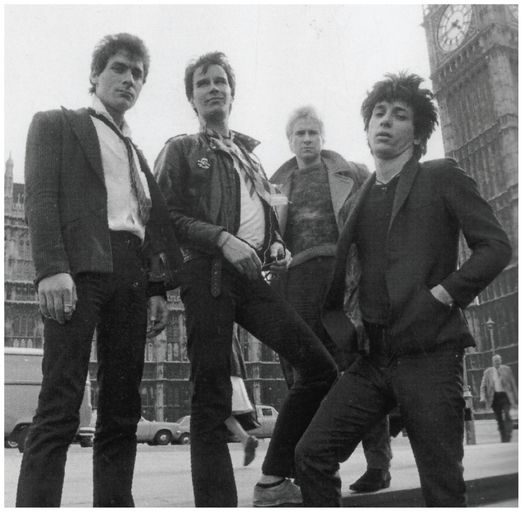
The Heartbreakers
Was it particularly good for John Lydon or anyone else in the band? Probably not, but it was fantastic news for the brand names of ‘Johnny Rotten’ and the ‘Sex Pistols’, because they were fast morphing from a band into an argument.
Danny Fields, the manager of The Ramones, the discoverer of Iggy Pop, the editor of Sixteen magazine, among a dozen other credits too numerous to mention, has always told me that this was what killed The Ramones, and every other American punk band’s chances of making it.
‘Malcolm’s strategy for the Pistols was the theory of chaos,’ Fields said, ‘It was out of control and had nothing to do with anything musical. It had to do with this phenomenon of terror that was coming out of England. They put safety pins in the Queen’s nose and and they would vomit and curse and say it’s the end of the world. I always say when the music moves from the music section to the front page of the newspaper, you’re in trouble.
‘It was news for the wrong reasons,’ Fields continued, ‘It was like, here’s the Pistols making front-page news in England every time they burped and farted, which they did a lot. So it was reported in America, and it couldn’t help but define punk rock, because as soon as something is on the seven o’clock news and on the front page of the newspaper, then that is punk rock.’
As right as Danny was, the Pistols’ story didn’t end there – in May of 1977, they signed to Virgin, their third label in 12 months. They quickly released their second single, ‘God Save The Queen’, during Queen Elizabeth II’s Silver Jubilee celebration.
As some fans have noted, ‘God Save The Queen’ was an attack on the ideals and institutions of Britain, delivered in Johnny Rotten’s trademark sneer. The song is summarized in the line “There is no future... in England’s dreaming,” which became a de facto position statement for British punk.” (England’s Dreaming is also the title of John Savage’s great book on the Sex Pistols, which, if you haven’t read, you should).
In celebration of the success of the record, Malcolm chartered a party boat, and the band sailed down the Thames – past Westminister and the Houses Of Parliament – singing, ‘GOD SAVE THE QUEEN, SHE AIN’T NO HUMAN BEING!’ Since it was the week of the Queen’s Silver Jubilee Celebration, upon returning to shore, the police immediately raided the boat and took Johnny Rotten and his entourage into custody. Again, the Sex Pistols made headlines.
What had started as an innocent publicity stunt, soon became an opportunity for Royalists and other English folk who didn’t get the joke to get Johnny Rotten and kick the living shit out of him. The most costly incident happened when Johnny was assualted by Teddy Boys outside the Pegasus pub, making the headlines once again.
Never Mind The Bollocks, Here’s The Sex Pistols!, the band’s first and only album, was released on October 16, 1977. The album far surpassed every promise the band’s singles ever made – and then some. Like every action the Pistols now took, there was a media reaction – the Sheriff of Nottingham gave the band more headlines when he threatened a local record store with prosecution for displaying the ‘obscene’ cover.
The Sheriff of Nottingham? Now they even had their own Robin Hood-style mythology happening – as the trial heard expert witnesses testifying to the origins of the word ‘bollocks’ – saying it meant a ‘priest’, ‘testicles’ and in this case, ‘nonsense’. The case was thrown out of court, not before insuring that pre-release orders were so high for the album, that it immediately charted at number one.
Since it is every English band’s dream to conquer America, Malcolm finally had the goods with Nevermind The Bollocks, and set out to declare war on the USA. Things started off on a bad note when the Pistols were denied entry into the US because of some minor criminal convictions. The tour was pushed back from December 1977 to January 1978, and in the process, they cancelled their showcase on the hit American television show, Saturday Night Live.
Elvis Costello & The Attractions jumped in and appeared on the show, undoubtedly selling more Elvis Costello records than Sex Pistols. Unfortunately, the Sex Pistols missed their one big chance to show America how great they were musically. Had they appeared, Johnny Rotten probably would have become the new Bob Dylan or some other kind of international hero.
Instead things only got worse.
‘As the four musicians straggled toward the plane at London’s Heathrow Airport last week,’ Time magazine reported, ‘It was clear from their appearance that they were not just another Top 40 act. They spat in the air, hurled four-letter words (the mildest, ‘scum’) at the photographers and with malevolent glares set off shivers in their fellow passengers. Said one woman passenger in disbelief, ‘What are we flying with – a load of animals?’ No, just the Sex Pistols living up to their bad boy reputation as the prophets of British punk rock.’
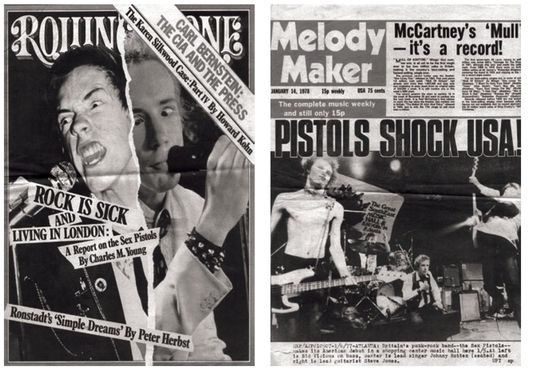
Of course, since I was the resident Punk at Punk magazine, I was destined to meet the Sex Pistols. The moment came on January 17th, 1978 at the Winterland Theater in San Francisco. I had been in Los Angeles with The Ramones, when John Holmstrom called from somewhere in America, on tour with the Pistols, and told me it was my duty to meet up with him and Punk photo editor, Roberta Bayley in San Francisco for the last date of the Sex Pistols American tour. My immediate reaction was, ‘I’m not going, this is stupid.’
My problem was The Ramones. If ever there was a group where each member believed in his heart that he was the star of the band – who never could give praise to anything except their own accomplishments – who were about to become even more bitter over the Sex Pistols success – it was The Ramones.
The Ramones’ hatred of everything non-Ramones should never be underestimated. From day one, they set the standard for everything punk in America, which is probably why it took a bunch of bratty English kids to sell Punk to the world.
When I told Joey Ramone that I had to go see the Sex Pistols in San Francisco, he acted like I had stabbed him in the back.
‘Yeah Legs, go hang out with your new best friends,’ Joey snapped ‘the Sex Pistols’.
Who could blame him? The Ramones had just released their third album, Rocket To Russia, and were headed for superstardom, they believed, when the train was derailed by Sex Pistols hysteria. Me and Joey watched on television as the Pistols crawled across America – and kids traded in their denim and flannel for black leather and leopard-skin prints – finally getting Punk.
‘The Sex Pistols were at a soundcheck when the Variety ’77 television show presented them on national TV for the first time,’ John Holmstrom wrote, ‘Alan King and Telly Savalas made a point of announcing their appearance every five minutes, ‘Coming up soon, the Sensational Sex Pistols!’
It was amazing. The Sex Pistols did in ten days what we had been trying to do for three years. And what was so humilating – it wasn’t being done because of The Ramones or Punk magazine, but because of these foreign creeps who got all the attention. And to add insult to injury, Warner Brothers, The Ramones’ parent company, dumped all their promotion money into the Sex Pistols, while The Ramones were left high and dry, once again.
It was hard to admit, but America didn’t want The Ramones or Punk magazine. In fact, nobody knew that we even existed. And the media had chosen the Pistols because they were the most easy to ridicule – the target was already pasted over their faces.
Take this quote from Time magazine, ‘Sure enough, the Pistols American debut was tame, almost a respectable happening. Johnny did not throw empty beer bottles at the audience. All he did was blow his nose a lot. Guitarist Steve Jones did not vomit, though in the past he has proven he has the stomach for it. Nor did bassist Sid Vicious sputter forth more than a few four-letter words. Sid did manage to draw cheers when he removed his shirt and revealed the torso of a 90-lb weakling. Both Vicious and Rotten sported hairdos that looked as if they had been blow-dried in a wind tunnel or plugged into a pre-amp.’
‘The Sex Pistols were more authentic than the New York punk bands,’ Mary claimed, ‘They had to be. That was their purpose. Their art was to be offensive, kind of like Iggy was in the early days. Iggy was more like the Sex Pistols than he was like The Ramones, in the spirit of those early performances.
‘The big thing that was happening in Punk,’ Mary asserted, ‘probably more so in Britain than America, was a real emphasis on purity and integrity. On not being a poser. Of being honest in a way – but if you made one wrong move, then everyone would pounce on you.
‘But once everything you do is extreme and everything you know is extreme,’ Mary asked, ‘Where do you go from there?’
Since I was in Los Angeles to interview Hugh Hefner and hang out at the Playboy Mansion, I didn’t think it would hurt my drinking to make a side-trip to San Francisco to see the Pistols, while I waited for Hefner to get back to me (he never did).
I picked up the receptionist at Playboy magazine, a beautiful brunette – and drove to San Francisco with a bunch of beer-drinking musicians who had to stop the van every twenty minutes to take a piss. We finally made it to the Miyako Hotel in Frisco’s Japan-Town after ten hours, where a luxury suite was waiting.
The greatest thing about seeing the Pistols was the Miyako Hotel – eating crab meat sandwiches with English Muffins from room service – while floating in this green stuff you poured in the tub. Myself and the receptionist spent most of our time in the tub eating crabmeat, while chaos ruled all around us.
There were hundreds of kids in black leather and bizarre ghoul make-up, standing in front of the hotel, trying to catch a glimpse of their heroes. But the big problem of the Pistols tour was Noel Monk and the Warner Brothers roadies, who decided to distance Johnny and Sid, who were traveling on the bus – from Malcolm McLaren, Steve Jones and Paul Cook – who were flying to every gig.
It was Malcolm’s promotional genius that dictated the band would play every backward American city, instead of going for the glamour of big cities, which is why they played Atlanta, Memphis, Baton Rouge, Dallas, Tulsa, San Antonio, etc.
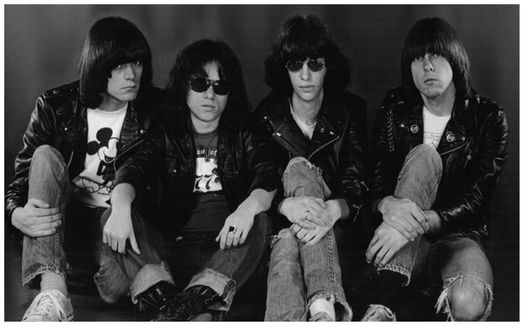
The Ramones
The two-week American jaunt was an exhausting, badly-planned, dispiriting experience for all concerned (Vicious was beaten up by the bodyguards hired to protect him, Rotten had a fierce head cold, and the band’s performances were plagued by bad sound and physically hostile audiences, mainly at unlikely venues in the South).
As Malcolm told Rolling Stone, “We never should have played Atlanta or Baton Rouge. How can the band write good songs when they are playing for college students? Next time we’ll play Mississippi and Alabama, so we can see how horrible things really are. If we’d have listened to Warner Brothers, we’d have played New York.’
Next time?
While Malcolm was all for adventuring, he didn’t want to travel on a bus to every backward American city. Therefore Johnny Rotten and Sid Vicious were sealed inside – with the Warner Brothers thugs – so television stations had something to film from their helicopters that followed the bus across America.
While Malcolm was busy trying to cause a teenage revolution, Noel Monk tried to steal the band from him. Of all the rock’n’roll assholes I have met in my life, Noel Monk was without a doubt the biggest. He had all the charm of a Hell’s Angel at Altamont, and tried to subvert Malcolm and the Pistols at every turn.
‘One of the English reporters complained to the tour manager, Noel Monk, about the treatment they’d received,’ John Holmstrom wrote, ‘Monk was standing behind one of his gorillas, leering down at this wimpy little reporter, shouting, “OH YEAH? WE’LL JUST SAY YOU TOOK A SWING AT US. IT’LL BE YOUR WORD AGIANST OURS, MOTHERFUCKER!” The reporter stood up to Monk, trying to reason with him, but after persistent violent threats, retreated to the bar.’
What was such a pity, was that the Pistols now needed a thug like this to keep the shit away from them. Being a Sex Pistol had become so physically dangerous, that they needed thug bodyguards to protect them.
‘I was on the tour bus with Johnny and Sid.’ Rock photographer Bob Gruen told me, ‘And it wasn’t only the the band who were crazy – the people who were supporting them were even worse. The Sex Pistols weren’t violent people, but by shouting out their boredom and rage with everything, they attracted the most bizarre reactions from every side.
‘One night, Noel Monk was asleep,’ Bob Gruen continued, ‘We pulled into a truck stop, like two or three in the morning, and Sid and I were up front, talking. We pulled into this place, so we jumped off the bus to get a hamburger. We sat down at the counter and ordered. I got a hamburger and Sid got some eggs. Noel came running in and said, “What are you doing? What’s going on? What’s happening here?” I said, “We’re getting something to eat. Nothing’s happening, you know?” Noel said, “Okay, well, come right back on the bus when your done.”
‘Everything was very normal, but then this big cowboy walked in with his family and took a seat at a table right next to us. The cowboy recognized Sid and started talking to him, and then invited Sid to join him at the table and eat with his family. Everything was fine, until I heard the cowboy say, ‘Oh, you’re Vicious, can you do this?’
“I looked over just in time to see the cowboy putting a cigarette out on his own hand. Sid was just sitting there eating his eggs with his knife and fork. He looked up, unfazed, and said, “Well, I can, you know, hurt myself…” Then Sid cut his hand with his knife and it made a small cut in the skin. Not very deep, but the blood started seeping out, slowly working its way down until it reached the plate of eggs. But Sid didn’t care, he was hungry and just kept gobbling them up.
‘And the more Sid ate, the more horrified the cowboy became, until he completely freaked out, jumped up, gathered up his family, and started running for the door.’
Had Noel Monk been the diner at the time, he probably would have murdered the cowboy’s entire family. You see, the Sex Pistols were so battered by being Sex Pistols, that they made a pact with the Devil so he would protect them – and like all Faustian bargains, there’d be no happy ending.
As soon as I arrived in San Francisco, John Holmstrom and Roberta Bayley told me that Noel Monk had accused Roberta of being a CIA agent and wouldn’t let her into the show that night at Winterland. ‘Okay, crazy-time’, I thought to myself.
‘Well, if Roberta can’t get in, than I’m not going either,’ I told Holmstrom, but he could see through my solidarity ploy as just an excuse to stay in the bathtub with my Playmate.
So I had to go to the show.
The Sex Pistols concert at Winterland sucked. During the early evening, Malcolm had tried to get some young, unknown bands to open the show, and it turned into a musical nightmare. Bad sound. Bad lighting. Bad vibes. When the Sex Pistols came on, it was just a continuation of the bad. Plus, they looked like the weren’t having any fun. In fact, they looked down right miserable.
Johnny Rotten finished the performance by saying those now infamous punk rock parting words, ‘Ever get the feeling you’ve been cheated?’
The only thing interesting about the entire performance, was when the band was leaving the stage, Sid paused, and nodded to the roadies – who pulled four young women out of the audience. That greedy Sidney. The girls were all knockouts too. I was jealous.
Right after the show, Roberta introduced me to Malcolm for the first time, and I told him the Pistols sucked. Malcolm agreed with me, saying he hoped he could find a new punk band to blow the Pistols away. Even their manager wasn’t having any fun.
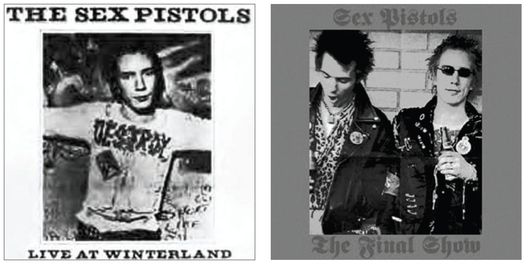
John Holmstrom found me after the concert, slapped a backstage pass on my jacket, handed me a tape recorder, and sent me to get a backstage interview with the band.
The backstage dressing room was a large rectangular room filled with old couches and green plastic garbage cans - filled with ice and Heinekens. Lucky for me, the pockets of my black leather jacket are ripped out, allowing me to fit an entire sixpack into my jacket.
On one wall, above the couches, someone had drawn, ‘The Sex Pistols’ in large, colorful letters, leaving me with the feeling that I was at some pathetic birthday party. I said hello to photographers Bob Gruen and Joe Stevens, both whom I knew from CBGB’s, and grabbed a beer.
Sid was the first Pistol I saw, sitting in a chair, with his shirt off, surrounded by the four groupies the roadies just pulled from the audience. John Holmstrom and Roberta Bayley, had told me over the phone from Tulsa, ‘You and Sid will get along great. He’s just like you.’
I thought, ‘Oh great, an idiot’. Sid didn’t do much to change that image.
I watched him, a bit shocked that anyone would be offering themselves to Sid after that performance. Then I rememberd, it doesn’t matter. The hype had done it’s job.
Sid asked, ‘Who’s gonna fuck me tonight?’
One of the girls, a bit shy answered, ‘How about a kiss first?’ It was like a really bad porno movie.
‘Poor Sid believed his own press,’ Cheetah Chrome told me, ‘He totally bought it, lock, stock and barrel. Sid was the perfect punk, I mean the guy came from fucking absolutely no musical background whatsoever, and just happened to be the best man for the job.
‘Sid had to be the most attention-getting man in the world,’ Cheetah laughed, ‘Yeah, let’s stick him in on bass,’ and next thing he’s an internationally famous rock’n’roll star, with like lots of money and no manners. No anything. If you put Sid and Peter Frampton, who was the biggest star of the world the year before, next to each other on a couch – Sid would have won hands down just by sheer force of personality. Sid was really rock’n’roll.’
Johnny Rotten looked a combination of embarrassed, painfully shy and angry, as the groupie said to him, ‘Hi Johnny, how do you do?’
Johnny spat back a, ‘Fuck you’.
The groupie turned red, and tried to smile. It was painful.
Johnny proceeded to go on a long rant about how, ‘How do you do’, was an invalid opening line. It was even more painful. Then photographer Joe Stevens introduced me to Rotten, who asked, ‘What the fuck is a Legs McNeil?!!’
‘What?’ I asked, a bit pissed.
Johhny immediately went on to something else, flittering around the room, trying to come down from that debacle he had just orchestrated onstage. He looked like a duck on crack, except that he was wearing a beret and a long overcoat, so that he actually resembled a French duck on crack.
I sat on a couch, sipping my beer, when Rolling Stone photographer, Annie Leibowitz, came marching into the room, complete with an assistant carrying umbrellas and lights. Annie set up her photography equipment in a curtained bathroom, off of the main dressing room. Bob Gruen and Joe Stevens smirked to themselves at the idea of getting a posed Sex Pistols shot in this atmosphere.
At this point, Annie Leibowitz, realizing she wasn’t going to have the band’s cooperation for a posed shot in the bathroom, approached Johnny, who was now sitting on the couch alongside me.
‘Johnny, will you sit next to Sid, so I can get a shot?’ she asked politely, holding her camera.
‘That fuckin’ tosser can get over here then,’ Johnny barked back.
Annie turned to Sid, still surrounded by the four groupies, and asked him if he would join Johnny.
‘Fuckin’ no way, tell that cunt he can come over here.’
This was going nowhere fast.
Sid and Johnny bantered back and forth, until Johnny turned to Annie and snarled, ‘You wanna take my picture? IS MY HAIR ALRIGHT? ’
Then Johnny Rotten shot her one of his famous stock-crazy-faces, and I decided to leave. I said goodbye to Bob Gruen and Joe Stevens, as Annie somehow got Sid and Johnny a bit closer to each other, so she could get her picture.
As I walked out of the dressing room, my jacket full of Heinekens, I bumped into famed New York groupie Damita who was nine months pregnant. She had a hole cut in her t-shirt so that her naked, pregnant belly was exposed. I ripped off my backstage pass and slapped it on her swollen stomach, and said, ‘Go get ’em girl!’ And then I walked off, happy to be done with the Sex Pistols.
‘Who could be bothered to listen to their music?’ Danny Fields argued, ‘Do you think Walter Cronkite was going to listen to 20 seconds of the music? There was no music on the network coverage of the Sex Pistols. It was simply that this sociological phenomenon from England that happened to play music, was playing here. What the Pistols did radical was in terms of music, which no one really appreciated. They were famous for the wrong reasons.’
Whatever Johnny had been when he played to those 50 people in Liverpool – he was now thoroughly damaged by the pummeling from everbody and everything
‘It’s unbelievable that a rock group,’ John Holmstrom wrote, ‘that played no more than 100 live performances (less then 50 according to guitarist Steve Jones) and existed for only 27 months , could become as internationally disliked as the Sex Pistols were.’
Little did I know, as I walked out of their dressing room, that it was the last time the Sex Pistols would be the Sex Pistols, for almost 20 years, until they would reform for another American tour in 1996.
Johnny Rotten would leave the band two days later.
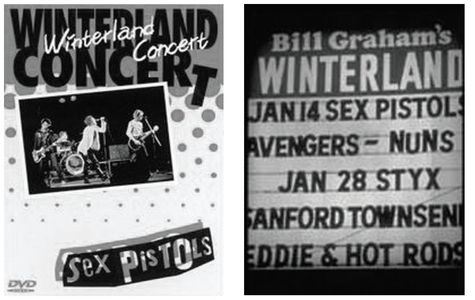
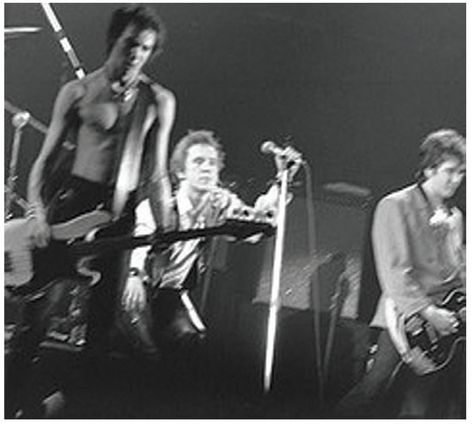
‘There’s a fine line between the brilliant and the retarded,’ Mary Harron claims, ‘But in a way, both Johnny and Sid were the Id of Punk, they are the thing itself; you can’t really separate them from it. They are these crazy destructive impulses – and they’re primitive – but they’re also very conceptual. Sid was very conceptual in the way he dressed – who is it that people want to look like? Sid became the very picture of punk. I know a Laotian couple who named their baby Sid Vicious.
‘The Sex Pistols really couldn’t continue as another band,’ Mary continued, ‘So I thought it was perfect that they broke up. I remember someone called me again to tell me that they had broken up and I was kind of like, “Oh, how perfect and true, they’ll never disappoint us.”’
Disappoint us? Never. Sid went on to be accused of murdering his girlfriend, Nancy Spungen, before he died of a heroin overdose himself. Johnny Rotten would sulk on the outskirts of the music industry, until he did his famous “I’m fat, I’m 40 and I’m back,” tour of America 20 years after the fact. And so the Sex Pistols came to represent the long-dead era of Punk Rock.
But I always wondered what would have happened if the Pistols hadn’t got all that attention and become such a spectacle. If they hadn’t made front-page news every time they so much as burped. What if the music – instead of the antics – had gotten through?
If you want to know who the Sex Pistols really were, and what they might have become if they hadn’t been chosen as the world’s first punk band – hoisted out of the gutter by the media to be ridiculed and scorned, you only have to look at their final UK performance – at Ivanhoe’s in Huddersfield, on Christmas Day 1977.
The Pistols played a benefit for the families of striking firemen, and as one critic wrote, “the gig was considered by some as a vindication of their anti-establishment stance when they were, for once, united with what might be viewed as their true constituency, the dispossessed British working class.”
The Pistols did two shows, a matinee and an evening performance which, if it had been reported fairly, might have reversed some of their negative press. As one critic reported, ‘Johnny Rotten mingled with the crowd wearing his pith helmet, and the good humour of the matinee – which was a benefit played for free – lingered on. Years later, the promoter of the evening show confessed that the Pistols never cashed his cheque.’
The Sex Pistols as naughty children, posing as bad boys, to raise money for striking firemen. It’s a nice image, right? Johhny Rotten fixing a nice piece of cake for the old ladies in the corner, while Sid handed out turkey sandwiches?
The Sex Pistols were a bunch of scruffy street urchins who enjoyed a good time. That’s the image I like to keep of them – getting drunk and playing at the Union Hall – while all the old ladies and gents looked on, disapprovingly.
(Johnny Rotten interview copyright 1976 by Mary Harron, used with permission of Mary Harron)
© Legs McNeil 2006
Legs McNeil
New York writer Legs McNeil co-founded the cult PUNK magazine in the mid-70s with John Holmstrom and another school friend. Indeed, the trio claimed to be the first people to ever use the word ‘Punk’ in the context of the brash new music they were then-writing about.
In more recent years, McNeil has co-written, Please Kill Me: The Uncensored Oral History Of Punk, (Little, Brown, 1996). In between, he has held the positions of Features Editor at Spin magazine and Editor-In-Chief at Nerve. He remains the foremost authority on the New York movement.